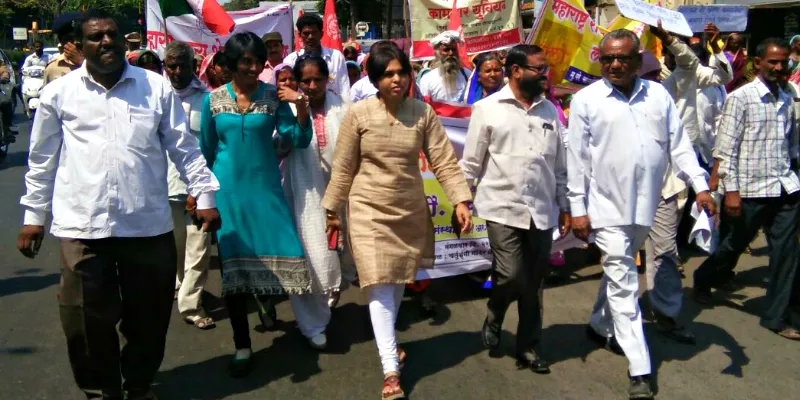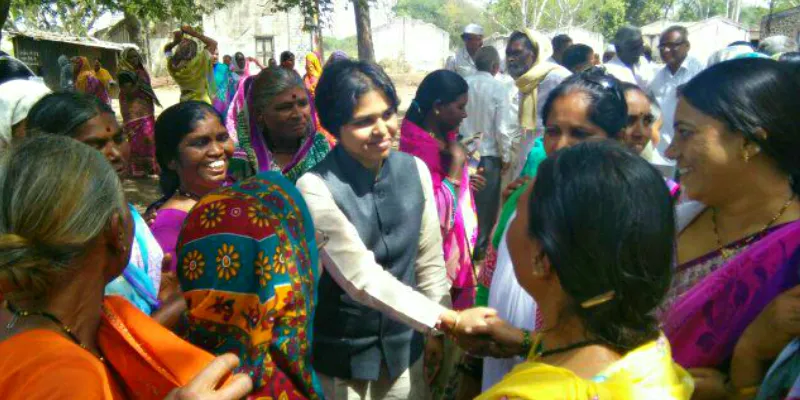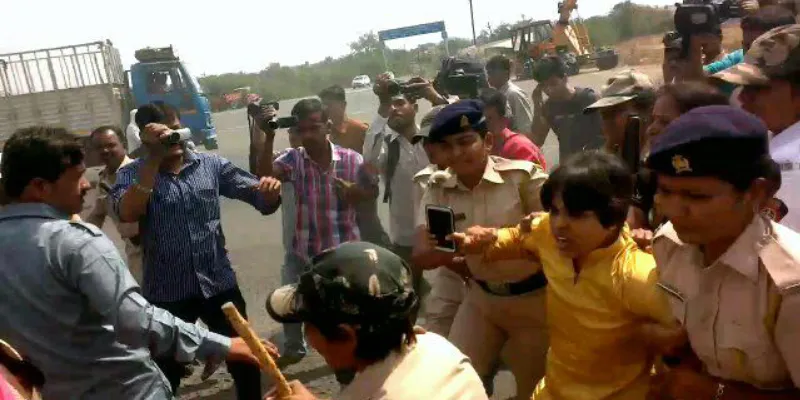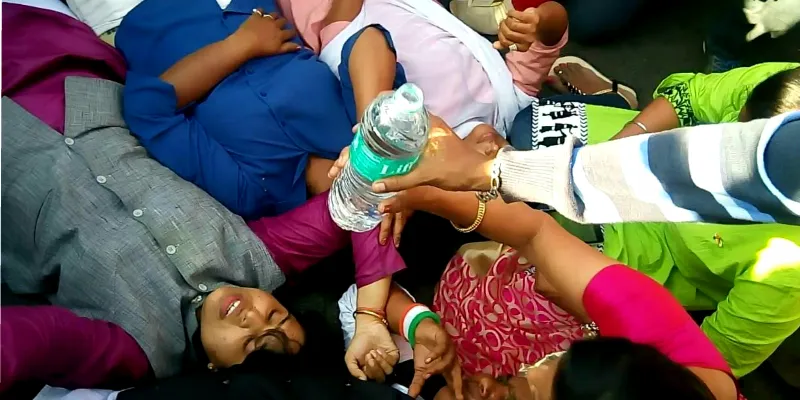'They brought acid to throw on me, and petrol to burn me alive in my car'– Trupti Desai, who opened hundreds of temples to women
“Trupti Desai offers prayers at the Shani Shingnapur temple…” read the papers, on a March morning.
Quite a banal happening, on the face of it, isn’t it? The travesty is that this seemingly mundane instance became possible only after a single woman rounded up thousands of other jaded woman-devotees into a firestorm of mutiny. She vowed to defend unto death the ‘right-to-pray’ of women in a country that feigns constitutional gender-equality, which is lost in translation within the layers of religious and cultural. And surely enough, a fight unto the finish is what the system has vowed to give her – as she braves threats, multiple attempts on her life, and ruthless defamation for her cause.

Few conversations – and even fewer people – have inspired me enough to shake off the air of inaction around my being and plunge me into the mode of rebellion. Trupti Desai happens to be on top of that list, and the conversation in question, is below:
Let’s delve a little into your background:
I was born in Nipani in Belgaum district in 1984. I went to school in Kolhapur first, and shifted to Pune Class V onwards. My father dedicated his life to the service of our Gagangiri Maharaj and lived at their ashram. I studied Home Science up to my third year, but could not continue because of some family issues. I was always interested in social work, right since college. If there were protests or rallies happening anywhere, I would always join. I was called a tomboy because of my attitude. I was always rebellious and aggressive.
So, you always had the makings of a revolutionary. When did that side overpower the other?
Right after I left college, I joined a slum-dweller rehabilitation programme,to help slum-dwellers get their rights, be it anything involving talking to the police authorities, or dealing with the government for their formalities like the ration card. Soon, there was a committee formed, of which, I was the president, for 3-4 years.
In 2007, I exposed a massive Rs 45-crore fraud involving Ajit Co-operative Bank. Ajit Pavar was a minister then, and no one really had the courage to speak out against him, for the fear of being ousted from the city. I got 35,000 depositors who had their accounts at the bank together to protest and even formed a committee named ‘Ajit Bank Depositors Sangharsh Committee.’ We protested vehemently. We once locked the DDR in the room and gave them an ultimatum that we wouldn’t let him out until they returned the money. We had a ‘Raasta Roko Andolan.’ In two years, we managed to win the fight and all of the deposits were returned.
You had locked horns with the bull and brought him down – but did this feel like chasing the dragon?
Indeed. This was a huge deal, because the people involved were all poor – daily wagers and minimum labour drawers. In 2010, I founded Bhumata Brigade and worked to bring to justice various cases of exploitation, violence and injustices against the disadvantaged, and especially women. We were also party to the Lokpal Movement, and the campaign to bring back black money.
When did the woman’s right to pray surface as a worthy and pressing cause?
In November 2015, a woman went up to the idol in the sanctum santorum of the Shani Shingnapur and prayed to it by touching it, and that sparked outrage.
I had never really questioned the practice, until that day. But when that lady went up there, and the committee declared that the idol is impure, and must be cleansed with cow’s milk, that made me wonder – I am also a devotee of the lord, I also fast in his name and pray to him. Why is it, then, that my reverence to him makes him impure?

I couldn’t tolerate this, and called for a meeting. I told my team that we must go up to the temple and fight against this bias. All these rituals and customs are man-made. There is no mention of such rules in the scriptures;these dockets are simply used as excuses to propagate a culture of patriarchy against women. They are a conspiracy to keep women from accessing their rights. We decided to go there and fight for equality– a right granted to us by the law. This idea of impurity and purity must be nipped at the bud.
The committee was instantly enthusiastic about putting up a fight. Four of us reached halfway to the platform on December 20, 2015, but the security beat us up and threw us out. We lodged a complaint with the police station, and gave them an ultimatum that if they do not make alterations to their rules in eight days, I will bring 400 women instead of four, to attain our goal. They, however, did not reply. I called for a press conference –and declared that we will return there on the January 26with 400 women, and pray inside the santorum. We had first gotten equality in the eyes of the legislature on that day 66 years ago, and it was a shame that we still had to fight for something so very basic.
Your committee was instantly persuaded, but swaying the societal opinion leaders you were taking on would have been no mean task…
Every single day, people would criticise me saying I was attacking a 400-year-oldtradition. Demonstrations and protests were led against me. The atmosphere got more and more tense leading up to the day – threats to cut off our hands and legs, or directly our heads, weren’t uncommon. Some told us that the lord himself will curse us. They asked me to “make sure your daughter was safe.” It became a law-and-order situation, and the police applied Section 144 for our protest –forbidding anything more than four people from congregating. I insisted that I am fighting for the fundamental rights of women, and I will brave even a 100 FIRs.
On the day, 1,500 women gathered for the cause; it was unprecedented. When they decided that they will not let us enter on foot,we decided to hire a helicopter, but we were denied the permission to fly. A whole lot of drama ensued- we were detained, but the CM also tweeted that he was with us. We stuck to the original plan, took to the roads, even rolled on them until we arrived at the gates of the temple. The Collector called for a meeting on the CM’s orders. On the day of Gudi Padwa, we managed to go up to the platform. And today, thousands of women worship there. The 1956 act says that women can enter up to the point men can go – and the High Court also ruled in our favour.

This had the potential to become a national movement and, surely enough, you struck the iron when it was hot. But you made more enemies than friends, didn’t you?
I was flooded with emails and messages from women all across the country, informing me about the outdated traditions in their localities and requesting me to act. So many women have followed my example and started their own movements across the country as well.
People tried to drag my name through the dirt in many ways during this struggle – by circulating obscene photos of me on social media like WhatsApp. They knew all too well that personal attacks on woman often deter them, when they run for cover for their dignity.
On March 27, the day of Mahashivratri, we took this campaign to Mahalakshmi Temple of Kolhapur and Trimbakeshwar temple in Nashik, and we were successful in entering all three places. We were threatened again, as they told us they will not spare our lives if we attempt to enter the sanctum santorum here.
On the 27, we were at Kapaleeshwar temple protesting, when they surrounded my car on the road and desecrated it, while I was inside with nine others. They brought acid to throw on me, and petrol to burn the car with – the police van was right behind me, but the cops turned around and fled the scene. At Kolhapur and Kapaleseshwar both, it was a miracle that I escaped with my life.

What kept you going, even as a sword constantly hung over your head?
You know, I get the sense that God himself somewhere wanted me to succeed. You should have seen the plight of the car. There’s no other way to put it, we felt God’s grace – it’s like we were reborn, and got a second chance at life.
And my family supported me greatly, even when they tried to defame me. Even my eight-year-old son was so encouraging! He feels, ‘If my mom isn’t allowed there, why should I go?’ I never even had to teach him – it’s so surprising, such little children understand these concepts, and we elders are blind to them.
You chose Haji Ali next – a move that angered the religious fundamentalists as well as the upholders of patriarchy…
My fight is not against religion – in fact, I do not follow just one particular faith or religion. My fight will always be for gender equality, for women. The Muslim women themselves approached us. Our committee has always been diverse and inclusive. There are honestly just a few rotten apples who are communal, and sexist and spreading this malice. We must not cower under their pressure.
Was Haji Ali a more treacherous operation? And it has still not seen a result…
We went to Haji Ali Dargah on April22. Eight to 10 of us went there at 5 am to assess what the restricted areas are. We again granted the authorities 15 days to lift the ban, but they didn’t relent. I did not announce my plan of action then because I had other things planned for my campaign and did not want to reveal our strategy, but we will surely get back to Haji Ali and see that case through.
What’s next?
For now, Kerala’s Sabrimala temple is next on our list, for the end of this month. I received many calls to take up this case. They stated that women are impure because they menstruate, and only little girls under 10 or older women above 55 are allowed. And I want to reason with them that even if they were to consider the menstrual cycle impure, women should be allowed access for the remaining 25 days of the month.
We want to take this fight to the national level. The ruling itself caused many temples to lift their bans, but there are many more yet to fall in line. The women’s movement is the biggest revolution of our time. And the right to pray is just the start. There are much greater areas where equality needs to be preached – and we have made a good start with this movement. When religion was made an excuse to perpetrate inequality, I could not tolerate it, because I am a devout devotee. Since so much propaganda against us has been passed off in the name of religion, cleaning it out was the best place to start in a god-fearing country like ours.







